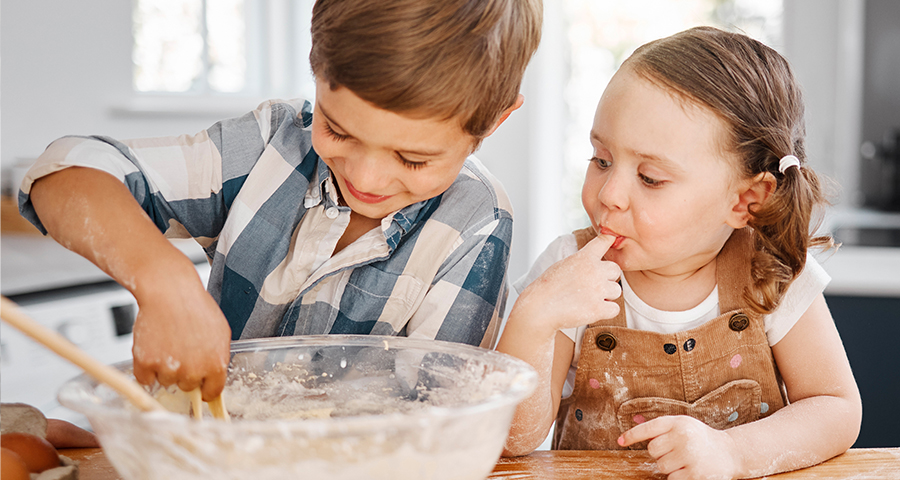Advice
teach kids a healthy relationship with food


Children’s Health / 17 February, 2025 / Ellie Thompson
In today’s world, where diet culture and conflicting nutritional advice are prevalent, fostering a healthy relationship with food in children is paramount. Rather than imposing strict food rules, which can lead to negative associations and eating habits, parents can adopt strategies that promote balance, understanding, and a positive outlook on eating. Elle Mace, Positive Psychology Coach & Master Practitioner in eating disorders, body image and self-worth shares her tips on how to teach kids a healthy relationship with food
Embrace Food Neutrality
The first tip on how to teach kids a healthy relationship with food is to embrace food neutrality. Labelling foods as “good” or “bad” can create a moral hierarchy that influences how children perceive eating. Instead, approach food from a neutral standpoint. Refrain from categorising foods as inherently positive or negative. Food is neutral, celebratory, and cultural. It is meant to be enjoyed in a very balanced way. ?
Involve Children in Food-Related Activities
Engaging children in menu planning, grocery shopping, and meal preparation can increase their interest in a variety of foods. There is a sense of pride and ownership that comes with seeing a meal, dish, or baking project from start to finish. ?
Model Positive Behaviour
Children often emulate their parents’ attitudes and behaviours. Be mindful of how you talk about your body and food in front of your children. Avoid saying things like “I feel gross/fat,” “I need to burn this off,” “I shouldn’t eat that,” or “that’s not on my diet.” All of these mindless phrases contribute to the mindset that some foods are better than others. ?If you are restricting or dieting, they are learning from you.
Avoid Using Food as a Reward or Punishment
Using food as a tool for behaviour management can lead to unhealthy associations. This creates a habit of punishing themselves as adults with food. Refrain from using food for reward or punishment. Instead, encourage children to listen to their bodies about what they want to eat and how much, and trust them when they give you the answer their body is telling them. ?
Encourage Mindful Eating
Teach children to pay attention to their hunger and fullness cues. Encourage them to eat slowly, savour their food, and recognise when they are satisfied. This practice helps them develop a healthy relationship with food and prevents overeating. Try not to refuse them food if they say they are hungry.
Foster a Positive Eating Environment
Create a pleasant mealtime atmosphere without distractions like television or mobile devices. Encourage family meals where everyone can share their day, making eating a communal and enjoyable experience.
Educate About Nutrition Without Pressure
Discuss the benefits of various foods in a way that’s informative but not coercive. Explain how different nutrients help their bodies grow and stay strong, fostering appreciation without creating fear or obligation.
Respect Their Appetite
Children’s hunger levels can vary daily. Avoid pressuring them to eat when they’re not hungry or to finish everything on their plate. Trusting their ability to self-regulate food intake promotes autonomy and healthy eating habits.
Be Patient with New Foods
Introduce new foods without forcing them. It might take several exposures before a child accepts a new taste or texture. Encourage them to try, but respect their preferences and give them time to adapt. Sometimes children need exposure of a good up to 30 times.
Seek Professional Guidance if Needed
If concerns about your child’s eating habits or relationship with food persist, consult a paediatrician or a registered dietitian. They can provide tailored advice and support to ensure your child develops healthy eating behaviours.
By implementing these strategies, parents can help their children build a positive and healthy relationship with food, free from the constraints of rigid food rules. This approach not only supports physical health but also fosters emotional well-being and a lifelong appreciation for diverse and nutritious foods.
Article by Elle Mace, Positive Psychology Coach & Master Practitioner
READ NEXT
Stepping In Or Stepping Back? How To Read The Room As A Grandparent
Giselle Boxer’s Top Tips For Aspiring Mumpreneurs
-

 Destination8 months ago
Destination8 months agoSingapore Airlines CEO set to join board of Air India, BA News, BA
-

 Breaking News10 months ago
Breaking News10 months agoCroatia to reintroduce compulsory military draft as regional tensions soar
-

 Tech News12 months ago
Tech News12 months agoBangladeshi police agents accused of selling citizens’ personal information on Telegram
-

 Gadgets3 months ago
Gadgets3 months agoSupernatural Season 16 Revival News, Cast, Plot and Release Date
-

 Productivity11 months ago
Productivity11 months agoHow Your Contact Center Can Become A Customer Engagement Center
-

 Gadgets3 weeks ago
Gadgets3 weeks agoFallout Season 2 Potential Release Date, Cast, Plot and News
-

 Breaking News10 months ago
Breaking News10 months agoBangladesh crisis: Refaat Ahmed sworn in as Bangladesh’s new chief justice
-

 Toys12 months ago
Toys12 months ago15 of the Best Trike & Tricycles Mums Recommend























